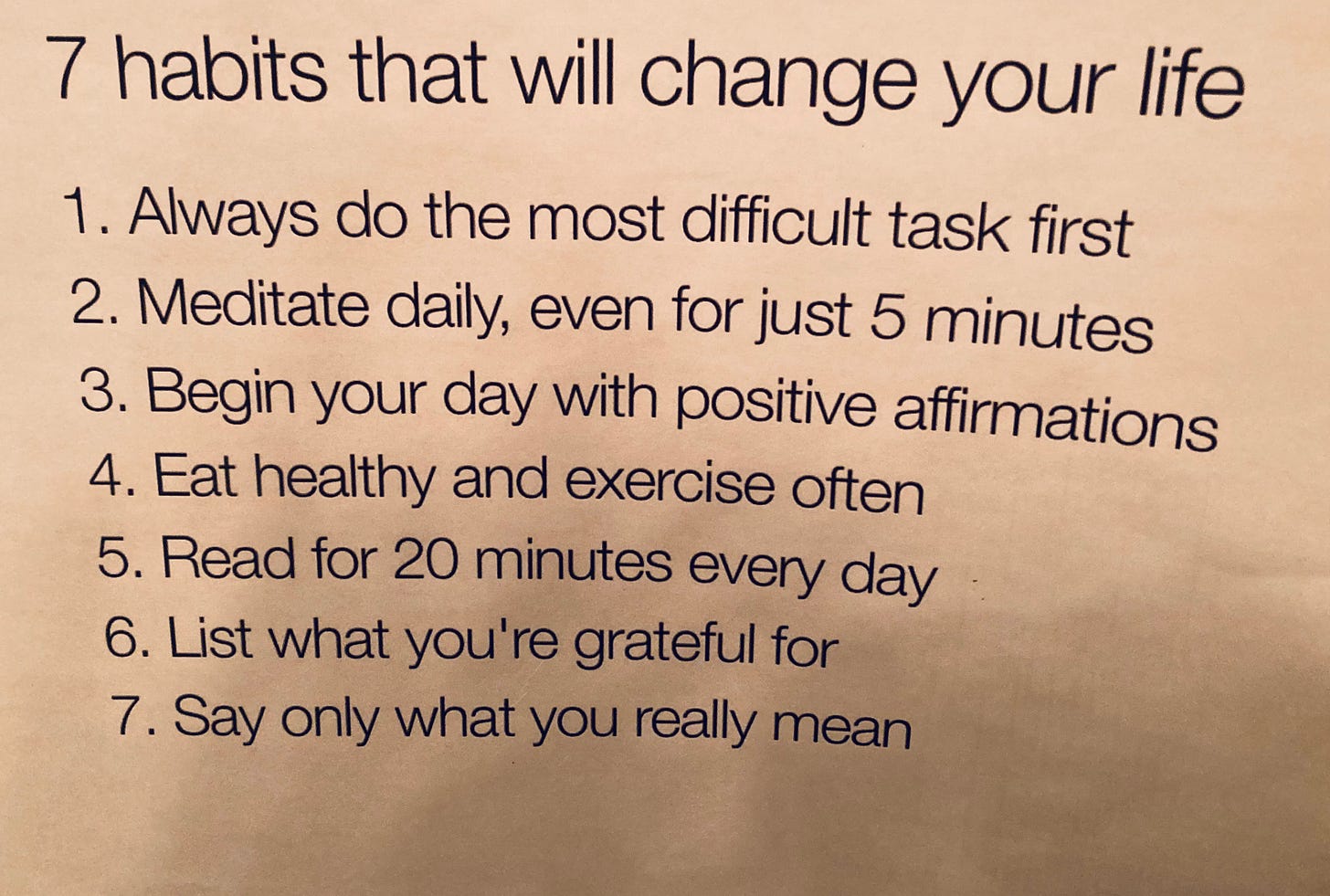As a self-employed writer, adhering to a self-imposed, regular work schedule is vital to my competence. This year during the month of August in Budapest, I devised a writing schedule that went something like this:
7 – 7.30am: Sacred Coffee Time. Fill in the well with inspirations and joy. Leggere in italiano.
7.30 – 10.30am (highest concentration level): Writing
10.30: recharge with a 15 min HIT exercise
10.45: Quick shower
11am – 1pm (high concentration level): More writing
1 – 1.30: lunch and coffee
1.30 – 3.30pm (fading concentration level): more writing, while being compassionate with myself when things go a little slower
3.30 – 4pm: yoga & meditation
4 – 5pm: e-mails, errands and other lower-level concentration activities
6 – 7pm dinner prep and eat.
Evening: Fill in the well with cultural outings / reading / meeting with friends
It was a simple routine, founded on some basic principles (reminiscent of the list of things I outlined in my post on “pockets of joy”) :
1. It is crucial for me to protect my writing time, especially when my concentration levels are at their peak. Which is why writing early in the morning (with all notifications turned off) works best for me, while I postpone all administrative duties like checking my e-mails and responding to them to the late afternoon when my energies are more depleted. E-mails don’t require the same sharpness that writing my book requires. But before I get to the important task of writing, I make sure that I get myself into a state of flow.
2. I honour my coffee time. How I start the day really sets the tone for the rest of my day. This is why I sip my coffee slowly and take 20-30 minutes to do a practice that brings joy into my life. I love to fill my well with inspirations, so I often read. Reading in Italian aloud brings immeasurable beauty and joy into my life, and provides a gentle warm-up to the state of flow that I hope to be able to tap into when I write more serious (and often emotionally demanding) material.
3. This might come as a surprise, but as much as I love yoga, I hate physical exercise. I have never stepped a foot in a gym, and I suspect that I never will. I can’t get myself motivated to use any of that intimidating looking machinery and I’m not a fan of suffering. But since I spend so many hours of my day with my butt in the writing seat, I absolutely need to move my body. When my concentration begins to dwindle (around 10.30am), instead of reaching for another coffee, I do a fifteen-minute high intensity exercise online. Even when I don’t feel like it, I tell myself that it’s only fifteen minutes, and that it would be over before I know it. In those short fifteen minutes I break into some serious sweat, after which I feel powerful, strong and ready to write some more. And I can always find fifteen minutes, no matter how busy I might be, because fifteen minutes is not two hours in the gym (including getting there and back), and fifteen minutes every day goes a long way. In the late afternoon I like to close my writing day with a twenty to thirty minute yoga practice, followed by a 10-15 minutes meditation. This short practice really helps me to switch off my forever thinking brain, and transition into a state of calmness. In the evenings I often go for a walk, and when in Budapest, I walk 10-15 km a day easily without even noticing.
4. I am conscious of what I put in my body. Even when I am not in the mood to cook elaborate meals, I make sure that I consume a large amount of fresh fruit and vegetables. I love my hearty salads, soups and smoothies that almost always contain ginger, garlic and turmeric.
5. I am conscious of the company that I keep. I am someone who gets an adrenaline rush from inspiring conversation. There is nothing I love more than stimulating interactions in which I feel that I am learning and growing, and exchange something real and authentic of myself with someone who allows themselves the same kind of vulnerability. Which is why I don’t waste my time on small talk and avoid people who drain my energy.
Needless to say, this is my writing schedule in an ideal world. It worked like magic while I stayed in Budapest in a newly renovated apartment that required very little cleaning, and without my daughters to take care of. More significantly, a month earlier I had been awarded a writing grant from the Quebec Arts Council that allowed me the privilege to write without having to take on various part-time jobs to support myself and my family. For the first time in my life, I was a paid writer! And because I was paid, I was also feeling the (encouraging) pressure to produce work. And work I produced. Lots of it. After more than two decades of balancing paid work with unpaid writing, and fifteen years of putting my family’s needs first, not a day in August went by without me thanking my lucky stars for being able to give my writing my undivided attention. Suddenly it felt like I had ample time. I wasn’t going to waste it away.
When I came back to Montréal at the end of August, I was determined to keep the momentum going. My oldest daughter then informed me that she would like to live with me full-time, and not half of the time, as her father and I had agreed years before. Although I am blessed with a fourteen-year-old daughter who is tidy, responsible and independent, and (the miracle of all miracles) pleasant to be around, she still has her needs and I have to make sure that there is food in the fridge.
Then October 7 happened and I lost a dear friend to cancer. For a couple of weeks my entire body was aching, assimilating the darkness and heaviness of the world. Like many people, I struggled to find lightness and hope. I continued to write, but producing anything of value felt mighty difficult. What was the point? Who cared about my writing – who needed it – when the world around us was falling apart?
By some lucky coincidence, at the beginning of October I had created my newsletter with Substack, without having a plan. I told myself that it was going to be my new shabbat ritual: to write for up to 3-4 hours every Saturday morning on any given topic that the week inspired. It was going to be my (enjoyable) break from the heavy book that I was working on, and therefore I couldn’t dedicate more than half a day to writing a single draft, and do a quick edit on Sunday morning before my private yoga class. Writing my Substack post thus became my spiritual practice, my karma yoga, with which I hoped to talk vulnerably about the darkness in our world, but also offer some light. Because I already had my writing grant, I approached my writing on Substack without the pressure to achieve anything, except enjoy being read at all. I was caught by surprise when I landed my first “founding member” (thank you Kristy!) without realizing that this option, automatically set by Substack, even existed. I felt, and continue to feel, a rush of joy with every subsequent subscriber (thank you everybody!) and all the touching comments I receive regularly in my inbox (thank you Jeri!) and directly here. But the most valuable skill that this new writing ritual has taught me is something that I continue to struggle with as a writer: letting go of perfectionism. It is an ongoing practice for me.
As I write this, there is a teachers’ strike and my daughters are at home. My oldest daughter and two of her friends are making cookies (and undoubtedly, a big mess) in the kitchen, while blasting some rap. This is my new work environment. Not exactly a Zen Budapest apartment. Naturally, I had to adapt my writing habits to these less ideal conditions.
In my current less-than-ideal writing schedule, you’ll find many of the same writing practices I managed to do under more ideal circumstances. I guard my daily sacred coffee time, my fifteen-minute HIIT exercise and short yoga and meditation practice. I continue to read in Italian. But I also do my own cleaning, food shopping and cooking, take care of the laundry and – I write a lot less, still in the mornings. I spend more time laughing with my girls and cheer myself up with episodes of Un professore on Raiplay. And, I go easy on myself. I remind myself that I can’t expect writing to always flow, and that I am not a machine who produces work with the same productivity levels at all times. I remind myself that ideal writing schedules are something to aspire for. Sometimes I manage them, sometimes I don’t. But beating myself up for not achieving this ideal will not help me to get closer to my goal of finishing writing a book. In the meanwhile, I prioritize what is most important, beautifully summarized by a note on my friend’s fridge:
Whoever wrote it, they stole the list from my private journal :)





